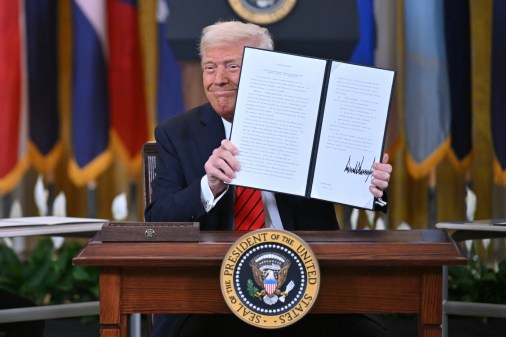The General Services Administration has added registration data on the entire fleet of federal vehicles to the National Law Enforcement Telecommunications System, an information sharing system that allows federal, state and local police officers to run routine checks on vehicles and drivers.
The effort, which began in 2008 when GSA developed its own Federal Motor Vehicle Registration System, makes registration information on more than 250,000 federally owned or leased vehicles available to law enforcement officers through NLETS — a nonprofit information sharing network that links law enforcement and motor vehicle databases together.
GSA announced Monday it intends to award a sole-source contract to NLETS for “fractional 128k T1 Frame Relay connectivity” for the purpose of providing law enforcement agencies with access to the latest federal vehicle registration information.
“Law enforcement personnel can access vehicle registration information from their onboard computers when making routine traffic stops or when otherwise monitoring vehicle/driver activity, and are thereby able to verify before approaching a vehicle that information such as make, model, model year, color, etc. match what is listed in the vehicle registration database,” GSA said in a redacted justification document posted on FedBizOpps.gov.
In addition to vehicle registration information, NLETS will also enable tracking of federal license plates, even when they are not mounted on a vehicle, according to GSA. “This includes the ability to track plates that are shipped from their production location (UNICOR) to the customer agency, as well as plates that are missing or unaccounted for, pending destruction, or destroyed,” the GSA contract document said.
The contracting documents, as well as program overview presentations reviewed by FedScoop, show that the federal government views the ability to track government vehicles and official license plates as a matter “critical to national security.”
FedScoop confirmed through NLETS and GSA officials that the entire fleet of nontactical federal vehicles — including 210,000 GSA Fleet vehicles and tens of thousands of others managed by individual agencies — are now available through NLETS. GSA is in the process of updating its official description of the program to reflect the availability of the entire fleet.
Officials also confirmed to FedScoop that GSA has added the Transportation Security Administration’s national privately owned vehicle fleet to the GSA database as well.
NLETS dates back to the Law Enforcement Teletype System established in 1966. That system relied on punched paper tape capable of approximately 100 words per minute that could be transmitted on one of only six telecommunications lines connecting all of the states.
Today, NLETS is a massive virtual data sharing network that connects 35,000 law enforcement organizations, 800,000 devices and processes nearly 1.5 billion data transactions every year. A modern network operations center powers the information sharing from Arizona, with complete replication available in a backup center located in Kentucky. In addition to vehicle registration information, NLETS also offers real-time access to criminal history information and Interpol data.
How it works
When a police officer stops a vehicle driven by somebody with an out-of-state driver’s license, the officer can query the NLETS system for information on the driver and the vehicle. The NLETS system verifies that the request is valid and then forwards the query to the motor vehicle database managed by the state where the driver has a license.
NLETS then receives data from the driver’s state motor vehicle department and law enforcement databases and forwards the information to the officer on the scene.
Until recently, law enforcement officers had no way of running these checks on all federally owned and leased vehicles.
“This not only protects the lives of police officers during routine traffic stops, but also plays a critical role in our national security by alerting law enforcement officials to federally tagged vehicles that are positioned in high risk or suspicious locations,” GSA said.






